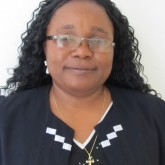
Audrey Mwansa is the Deputy Chief of Party for Creative’s Read to Succeed program in Zambia. In honor of International Women’s Day 2014, we asked for her thoughts on women in her country and her profession, and what inspires her.
Question: Please explain in what ways your program involves women.
Answer: Women are involved in all our trainings. Measures are taken to ensure that of the teachers we train, there is at least a 50/50 representation. In most rural schools where we operate, the majority of the teachers are men. As a program, we have been advocating for more female teachers who could be used as role models to the girls in order to help them aspire for higher positions as well as help them stay in school.
Q: As a woman, what is it like to work on these issues?
A: I find my work with women energizing and more empowering because of my firm belief in the fact that once you educate the girl you educate the nation and if you empower the woman you empower the nation. As an educator, this is why I invest all my energies in issues that empower women and girls.
Q: What is it like to be a woman in the country you work in?
A: To be a woman in Zambia is at times challenging due to cultural norms which work against their welfare. No matter how educated one is, the man always remains the head and the decision maker in the household. I believe that if women are to be effective agents of change, particular attention should be paid to enhancing their contribution and taking into account their needs, multiple roles and changing economic and family situations. This means that more recognition must be given to their current and potential contribution as producers, as decision-makers and as income-generators.
Q: The theme of this year’s International Women’s Day is “Inspiring Change.” What changes have you helped make possible that you are proud of?
A: Well first I’d like to say that International Women’s Day should not be taken as merely a one day celebration but an ongoing celebration of the successes women educators have contributed to the development of nations.
As a female educator, I have contributed to the change in the lives of girls through advocating for policies (such as the re-entry policy for school girl mothers to go back to school after giving birth). Through this policy, girls who would have otherwise completely dropped out of school after giving birth have now been given a second chance to complete their education. I have seen girls who once dropped out of school due to pregnancy and came back due to the policy excel in their education – some of them have even completed university degrees. Previously, pregnant girls were not given a second chance. My involvement in advocating for affirmative action for women has also seen a number of qualified women ascend to higher positions such as school managers. Previously very few women were promoted to positions of head teachers of schools.
Q: Who or what inspires you to keep pushing for positive change?
A: My mother and many African women who work hard to stand up for their families. Their simplicity and love for their families and the welfare of the nation inspires me. I am also inspired by women who have excelled in male-dominated jobs – “the no-go area for women.” “When you educate a man you educate but one single man” but “when you educate a woman you education the nation.” For our nation to see meaningful change and development, we need to empower women.

